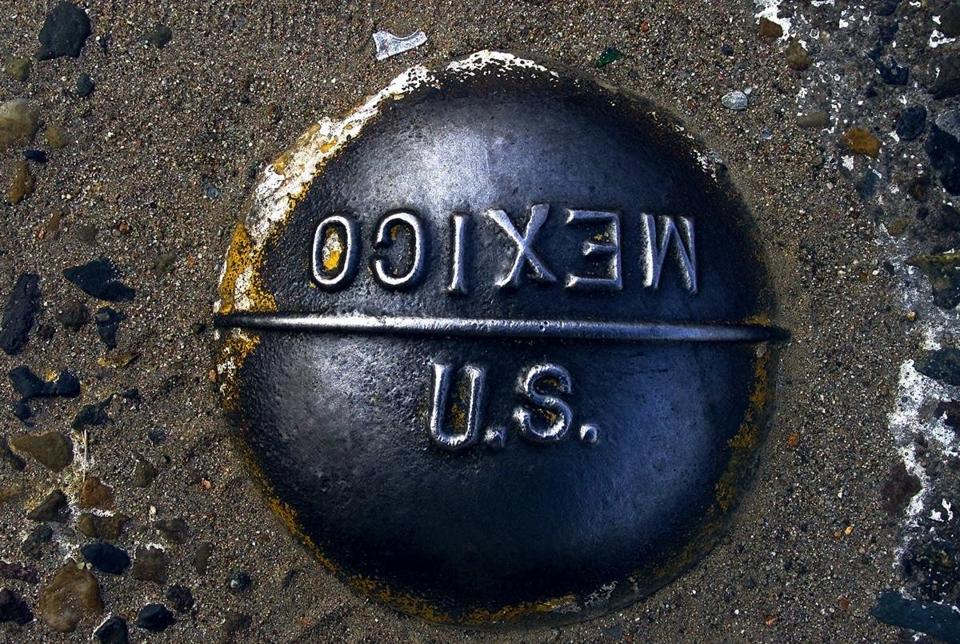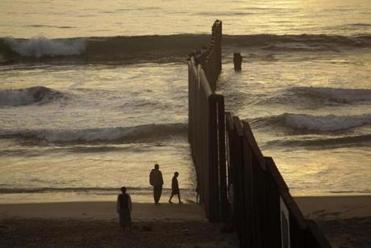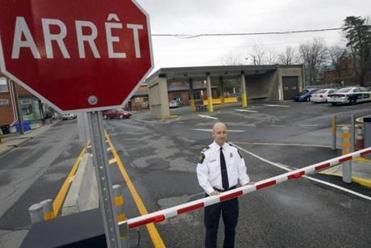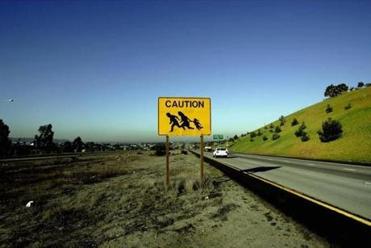America’s borders, porous from the start
Our immigration debate ignores a key fact: the nation’s perimeter has never been secure.
AP Photo/Damian Dovarganes
A marker embedded in the pavement marks the imaginary line between the United States and Mexico at the San Ysidro border crossing between San Diego, Calif., and Tijuana, Mexico.
By Peter Andreas Globe Correspondent March 03, 2013
As the immigration reform debate in Washington heats up once again, a constant refrain is the necessity of “securing the border.” Many policy makers insist that we cannot deal with immigration until we come to grips with our porous borders, especially the 2,000-mile-long line dividing the United States and Mexico, which has for decades been the most important gateway for unauthorized entry. Implicitly, that porousness is treated as abnormal and unusual—and fixable. It’s easy to assume our borders were once a genuine barrier, and could be again.
History suggests otherwise. For better and for worse, America’s borders have always been highly porous, and to imagine a secure line around the country is to be falsely nostalgic for a past that never existed. The unauthorized movement of people is an American tradition, one that goes all the way back to the country’s founding and which originally fueled its settlement. Millions of people—not just of Latin American origin but also those whose ancestry is European, Slavic, Jewish, and Chinese—have forebears who broke some law in the process of settling in this country and becoming Americans.
Porous borders made the United States. To look at the country today is to see a nation that grew up and developed because of—not despite—leaky borders. And that suggests that the question today is not how to “seal our borders”—a fantasy that is neither viable nor desirable—but rather how to better manage them and cope with the inevitable consequences of unauthorized entry and settlement.
***
I n the colonial era, border control in North America had a largely different focus: Authorities worried about the cross-border movement of goods more than people. Strict imperial trade laws meant that economic relations with the Colonies’ southern neighbors were to a significant extent founded on various sorts of smuggling. For instance, the rum distilleries in Colonial New England (which produced the region’s most important export) were kept in business by the large-scale smuggling of molasses from the French West Indies in violation of British trade rules.
Essdras M Suarez/ Boston Globe
A border sign off Caswell Street in Derby Line, VT.
The first effort to impose border controls on the flow of people was actually aimed at the American Colonists themselves, as they relentlessly tried to push westward—and the restrictions came straight down from the top. With the British Proclamation of 1763, King George III imposed a frontier line separating the Colonies (which Colonists were allowed to move among freely) from the Indian territories west of the Appalachian Mountains. The king prohibited Colonists from moving across the line to settle, and deployed thousands of troops to try to enforce the law. The British feared loss of control over their subjects and also wished to avoid conflicts between Colonists and Indians.
In response, the Colonists simply ignored the proclamation, and thousands moved into what became Kentucky and Tennessee, seeking land and a better life. To them, the frontier controls were just another attempt by the British crown to tell Americans what they could or couldn’t do. Tensions between the Colonists and British authorities over freedom of movement intensified all the way up to the outbreak of the American Revolution.
After Independence, that tension persisted over a different kind of unauthorized migration: Thousands of ambitious British artisans smuggled themselves out of Britain in violation of their country’s strict exit controls. They were eagerly welcomed in the United States, and helped jump-start the American industrial revolution.
AP Photo/Dario Lopez-Mills
People at a beach next to the border fence separating Mexico from the US in Tijuana, Mexico.
The young country’s freedom from Britain opened up enormous new opportunities for illegal westward movement. In the 1780s, Congress passed ordinances enabling the national government to survey and sell off territory beyond the original states; the idea was to raise revenue, deter squatters, and promote orderly westward migration and settlement. But a flood of unlawful settlers undermined these plans. The laws became increasingly harsh as the problem persisted and grew. The Intrusion Act of 1807 criminalized illegal settlement and authorized fines and imprisonment for lawbreakers. But these measures were largely ineffective. In fact, some of the trespassers were ultimately rewarded for their pains: The territory that is now Vermont and Maine was settled by illegal squatters who refused to buy the land from the legally recognized owners and violently resisted government eviction efforts. Eventually, those territories won statehood.
That pattern repeated itself for decades: illegal settlement, intense (and sometimes violent) resistance to central government authority, and finally official resignation to the reality that illegal movement had created. The westward migration included European immigrants who entered the country legally but then settled illegally (in some ways not so different from the “visa overstayers”
AP Photo/Toby Talbot
Miguel Begin, the chief of operations for the Canada Border Services Agency's Stanstead sector, stood at the Canadian port of entry in Stanstead, Quebec.
who today represent as much as half of the country’s unauthorized immigrant population). Failing to deter and remove illegal settlers, Congress passed “preemption” acts, first in 1830 and again in 1841. These were essentially pardons for illegal settlement, providing legitimate land deeds at discounted prices. The law, in other words, adjusted to the facts on the ground.
Not until the 1880s did the federal government get into the business of controlling immigration in a serious and sustained way—triggered by worries about too many Chinese arrivals. Until then, immigration was largely left to the states to sort out. Starting in the 1850s, tens of thousands of Chinese laborers had been welcomed to the American West as a source of cheap labor, in particular to help build the railroads—but not given any means to become citizens. When the demand for Chinese labor dried up, an anti-Chinese backlash quickly followed. As political pressure to respond to the “yellow peril” intensified, Congress first passed the Page Act of 1875, followed by the far more sweeping Chinese Exclusion Act of 1882, which barred the entry of Chinese laborers (mostly through seaports such as San Francisco).
With this front door largely closed, Chinese immigrants turned to entry though a back door: Canada. Canadian officials knew full well that most of the arrivals from China were just passing through. As one Canadian official bluntly told an American journalist in 1891, “They come here to enter your country, you can’t stop it, and we don’t care.”
Bill Porter/Globe staff
Kevin Haskew, a field engineer with the International Boundary Commission, dug out a boundary marker in the town of Hodgdon, Maine.
Eventually, American pressure on the Canadians to deny entry to Chinese prompted the people-smuggling business to shift south—to Mexico and the Southwest border. The US-Mexico border already had a long history as a gateway for smuggling goods, in both directions; now, it became a gateway for smuggling people as well. Foreshadowing future developments, a January 1904 editorial in the El Paso Herald-Post warned, “If this Chinese immigration to Mexico continues, it will be necessary to run a barb wire fence along our side of the Rio Grande.”
Chinese immigrants were not the only “undesirables” coming in through Mexico. By the last decades of the 19th century, federal law also prohibited the admission of paupers, criminals, prostitutes, “lunatics,” “idiots,” and contract workers. Lebanese people, Greeks, Italians, Slavs from the Balkans, and Jews were especially targeted with these restrictions. When turned away at official ports of entry, they found the illegal Mexican crossing to be a convenient alternative. Worries over these immigrants became so acute that when the US Border Patrol was created, in 1924, its priority target wasn’t Mexicans but
Europeans.
Along with them came a growing influx of unauthorized Mexican workers. But these immigrants were largely tolerated, with employers in the Southwest informally recruiting large numbers of Mexicans to work in agriculture. Formal, legal entry was complicated, but crossing the border illegally was relatively simple and largely ignored. Strict controls against Mexicans crossing the border were widely perceived as neither viable nor desirable. As a substitute for European and Asian workers, Mexicans were considered an ideal labor *******: flexible, compliant, and temporary—a vital source of labor for agriculture and other sectors of the economy.
***
Fast forward to today’s immigration debate, one deeply afflicted by historical amnesia. When politicians call for us to “regain control” of the border, they evoke the false notion that the border was ever “under control” in the first place. This amnesia also means we ignore what happened to those who were once America’s most dreaded “undesirables”: Many of those Chinese laborers and Europeans stayed on and reared families whose descendents are unremarkably American today. Meanwhile, the Mexican workers who were once tolerated and encouraged as a source of cheap labor have in recent decades prompted the greatest border enforcement crackdown in the country’s history.
HECTOR MATA/AFP/Getty Images
A sign on a freeway warned drivers of people crossing in Chula Vista, California.
Does our long history of porous borders mean we should simply throw up our hands and give up on the whole idea of border control? Of course not. All nations have the sovereign right to regulate who and what crosses their borders. There are legitimate border security concerns, ranging from the cross-border flow of weapons to the potential entry of terrorists. But our border expectations need to be tempered. Rarely is the border the real source of domestic problems or the most effective place for the solution. This is nowhere more evident than in the case of labor, where the conditions in the source countries, job opportunities in America, and lax workplace regulations are far more important factors.
Our nation’s borders can certainly be more effectively managed and regulated, including long overdue investments in improving and modernizing the infrastructure at our ports of entry. These improvements would not only help to discourage unauthorized crossings but also facilitate the mass volume of legal crossings that are part of the lifeblood of our economy. But by any historical standard, our borders today are far more heavily policed, closely monitored, and difficult to cross than ever. As with the “preemption acts” of the 19th century, our immigration laws need to adjust to the realities on the ground, in which millions of people have illegally settled in the country and are hardly likely to simply pick up and leave. To expect otherwise is to ignore a
centuries-old American tradition.
Peter Andreas is a professor of political science and interim director of the Watson Institute for International Studies at Brown University. This essay is adapted from his new book, “Smuggler Nation: How Illicit Trade Made America.”







